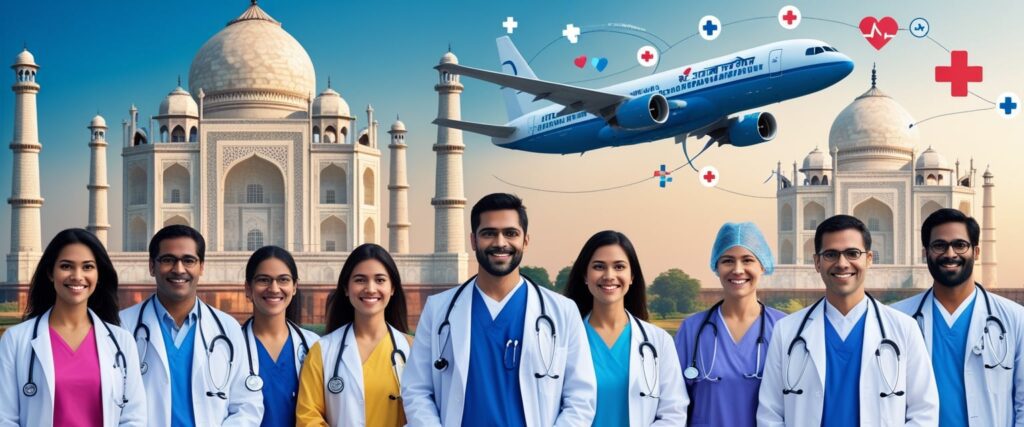Planning your treatment abroad can be both exciting and overwhelming especially when the destination is India, a country known for world-class healthcare and affordable medical procedures. Every year, millions of international patients travel here to access advanced treatments, skilled doctors, and compassionate care at a fraction of Western costs. But before you pack your bags, it’s crucial to know how to make the right hospital choice. Understanding How to Choose a Hospital for Medical Tourism in India can make all the difference between a smooth recovery and unnecessary complications.

In this comprehensive guide, we’ll walk you through the essential steps on How to Choose a Hospital for Medical Tourism in India, covering everything from accreditation and specialization to doctor qualifications, technology, and patient reviews. Whether you’re considering cardiac surgery, cosmetic procedures, or fertility treatment, this article will help you make an informed decision that prioritizes both safety and quality ensuring your medical journey to India is as successful as it is affordable.
Table of Contents
How to Choose a Hospital for Medical Tourism in India?
Did you know that medical treatment in India costs 60-90% less than in the US or Europe without compromising on quality?
We’ve seen India emerge as a leading destination for medical tourism, with millions of international patients seeking top-notch healthcare services at affordable prices. The combination of cutting-edge technology, highly skilled doctors, and a warm, welcoming environment creates an exceptional experience for patients from around the world.
However, selecting the right hospital and doctor isn’t just about saving money — it’s crucial for ensuring quality care, optimal treatment outcomes, and cost efficiency. While India offers world-class medical facilities comparable to Western standards, the overwhelming number of options can make choosing difficult.

That’s why we’ve created this comprehensive step-by-step guide. We’ll walk you through the essential factors to consider when selecting a hospital and doctor in India, from verifying credentials to spotting red flags. By the end of this article, you’ll have a clear roadmap for making an informed decision about your medical journey to India.
Understand What Matters in a Hospital
When selecting a hospital for medical tourism, looking beyond surface-level features becomes essential. The choice you make directly impacts your treatment outcome, safety, and overall experience.
Why accreditation is non-negotiable
Accreditation serves as an independent validation that a hospital meets stringent quality and safety standards. Specifically, accreditation bodies evaluate healthcare facilities based on patient care protocols, medical staff qualifications, infection control measures, and safety standards. This external verification process ensures that hospitals maintain internationally recognized benchmarks for healthcare delivery.

Research indicates that accredited hospitals demonstrate better clinical outcomes, including decreased rates of hospital-acquired infections and mortality. Furthermore, accreditation provides international patients with confidence that they’ll receive care equivalent to standards in their home countries. Before finalizing your choice, verify that the hospital’s accreditation comes from recognized organizations such as Joint Commission International (JCI).
How hospital specialization affects outcomes
A hospital’s specialization level significantly influences treatment results. Studies show that increased hospital specialization correlates with decreased length of stay and reduced medical expenses after adjusting for patient and hospital characteristics.

Hospitals focusing on specific medical areas develop deeper expertise and streamlined processes. This specialization strategy contributes to reducing production costs while improving service quality. Additionally, research demonstrates that specialist hospital organizations provide superior quality of care and enhanced financial performance compared to generalist facilities. When researching options, prioritize hospitals with strong specialization in your particular medical condition.
The role of technology in modern treatment
Modern healthcare is primarily driven by technological innovation. Advanced medical equipment, digital information systems, and specialized technology all contribute to better patient outcomes.
Health information technology improves patient safety by providing comprehensive data access, medication alerts, and prompt diagnostic results. Digital systems allow hospitals to minimize administrative tasks, maximize patient time, and streamline medical billing—ultimately reducing operational costs while enhancing patient experience.

Since technological capabilities vary widely between facilities, assess whether the hospital offers the specific technology required for your treatment. This includes both diagnostic equipment and treatment technology essential for your medical condition.
Evaluate the Doctors Before You Decide
The qualifications and expertise of your doctor directly impact your treatment success. Consequently, thorough evaluation of medical professionals should be a cornerstone of your decision-making process.
Check qualifications and global training
Many physicians in India have received training and board certification in the United States or other Western countries, providing them with international standards of practice. Look for doctors with fellowships in American medical societies or certification from reputable organizations like the American Board of Medical Specialties (ABMS), which is the gold standard for medical certification in the USA. Moreover, the General Medical Council (GMC) in the UK and the European Union of Medical Specialists (UEMS) offer recognized certifications that validate a doctor’s expertise.

Look for experience in your specific procedure
Studies consistently show that surgeons who perform procedures frequently have better outcomes with fewer complications. Accordingly, ask these essential questions:
- How many times have you performed this procedure in the past year?
- What are your complication and success rates?
- How many years have you been performing this surgery?
- Are you board-certified or fellowship-trained in this specialty?

A data analysis found that patients undergoing knee replacements at low-volume facilities had a 50% higher risk of death and 25% higher readmission rates.
Read patient reviews and testimonials
An overwhelming 94% of patients use online reviews to evaluate healthcare providers, and 77% use them as their first step when searching for physicians. Primarily focus on reviews that offer specific details about treatment processes, staff interactions, and results rather than vague comments. Consider the consistency in feedback and how recently reviews were posted, as these provide insight into current practices.

Use video consultations to assess communication
Telemedicine has become essential in medical tourism, allowing you to “meet” your doctor beforehand. Use video consultations to share test results, understand treatment plans, and compare advice from multiple international doctors. This initial interaction gives you valuable insight into the doctor’s communication style and ability to explain complex medical concepts clearly. For patients who don’t speak the local language, these consultations help determine how effectively you’ll be able to communicate with your healthcare team.

Follow a Step-by-Step Selection Process
Creating a methodical approach for selecting the right hospital ensures you make an informed decision instead of a rushed one. Here’s how to proceed systematically:
Define your treatment needs and budget
Begin by clearly articulating your specific medical requirements and understanding the complexity of your procedure. Calculate total expenses including medical fees, travel costs, accommodation, food, international calls, and medications. Medical tourism in India can save 70-80% compared to US retail costs, but always set aside funds for contingencies.

Shortlist hospitals based on your condition
Focus on facilities with expertise in your specific treatment area. Verify international accreditation from organizations like Joint Commission International (JCI), which ensures the hospital meets global standards. Consider working with a reputable medical tourism company that can provide comparative information about different hospitals without additional cost to you.

Compare treatment packages and inclusions
Examine what each package covers – surgery costs, hospital stay, pre-op tests, and post-operative care. Beware of unusually low prices that might indicate quality concerns or hidden fees. Request transparent cost breakdowns before making commitments.
Schedule virtual consultations with doctors
Utilize telemedicine to connect with specialists before traveling. These online consultations help assess treatment feasibility, confirm logistics, and develop personalized care plans. Use this opportunity to evaluate the doctor’s communication style and willingness to explain your treatment plan.

Finalize travel, visa, and accommodation
Research visa requirements well in advance – many countries offer specific medical visas. Choose accommodation near your treatment facility to minimize transportation challenges. Consider purchasing travel insurance with medical tourism provisions to cover potential complications.

Watch Out for Red Flags and Hidden Costs
Being vigilant about red flags can save you from potentially disastrous medical tourism experiences. Despite the growth of medical tourism to a USD 53.70 billion industry, careful scrutiny remains essential before committing to treatment abroad.

Hospitals without accreditation proof
Accreditation serves as the cornerstone of trust, quality, and patient experience. I always recommend seeking hospitals accredited by recognized bodies like Joint Commission International (JCI). Particularly concerning are facilities claiming “local accreditation” or those “working toward certification”. Essentially, verification is crucial – always request specific accreditation numbers and certificates that you can independently verify. Remember that accreditation means a facility meets average care standards for that community – nothing more.

Unusually low prices or vague quotes
Although price savings attract many to medical tourism, unusually low costs often signal compromised quality. Indeed, complications from medical tourism can result in additional expenses between USD 25,000-75,000. Watch for these warning signs:
- Base prices that exclude diagnostics, lab work, or operating room fees
- Packages requiring full payment before consulting with your surgeon
- Failure to provide itemized cost breakdowns

Doctors unwilling to share success rates
Transparency about success rates indicates professional confidence. Nevertheless, if physicians evade questions about their experience or success metrics, consider it a serious warning sign. Medical professionals should willingly provide information about their qualifications and procedure outcomes. If they seem reluctant to answer your queries, it often suggests they may not have the expertise they claim.

Conclusion
Medical tourism in India offers remarkable opportunities for quality healthcare at a fraction of Western costs. Throughout this guide, we’ve explored essential factors for making informed decisions about your medical journey. Accreditation stands as the foundation of hospital quality, while specialization directly correlates with better outcomes for your specific condition. Additionally, technological capabilities and doctor qualifications significantly impact your treatment success.
Following our step-by-step selection process helps ensure you find the right hospital and doctor combination for your needs. First, clearly define your treatment requirements and budget. Then, create a shortlist based on specialized expertise and proper accreditation. After that, compare treatment packages carefully while scheduling virtual consultations to assess your potential doctors personally.
Vigilance regarding red flags protects you from potentially disastrous experiences. Unaccredited hospitals, suspiciously low prices, and doctors unwilling to discuss their success rates should prompt immediate reconsideration of your options.
Remember that your health deserves thorough research and careful consideration. The cost savings of 60-90% compared to Western countries make India an attractive destination, yet quality care must remain your priority. Armed with the knowledge from this guide, you can confidently navigate your medical tourism journey to India, securing excellent treatment while enjoying significant financial benefits. Your medical journey abroad becomes not just affordable but also safe and successful when you approach it with proper preparation and due diligence.
Key Takeaways
Choosing the right hospital for medical tourism in India requires careful evaluation of key factors that directly impact your treatment success and safety.
• Prioritize accredited hospitals with specialized expertise – Look for JCI accreditation and facilities specializing in your specific condition for better outcomes and safety standards.
• Thoroughly vet doctors through qualifications and consultations – Verify international training, procedure experience, and use video consultations to assess communication before committing.
• Follow a systematic selection process with transparent pricing – Define your needs, compare detailed packages, and schedule virtual consultations while budgeting for total costs including travel.
• Watch for red flags like missing accreditation or unusually low prices – Avoid hospitals without proper certification, vague quotes, or doctors unwilling to share success rates.
• Medical tourism in India offers 60-90% cost savings without compromising quality – With proper research and due diligence, you can access world-class healthcare at significantly reduced costs.
The key to successful medical tourism lies in balancing cost savings with quality assurance through thorough research and verification of credentials.
Frequently Asked Questions
What are the rules for medical tourism in India?
Visa requirements: India issues a Medical Visa (M-Visa) for foreign patients seeking treatment in accredited hospitals. Accompanying family members can get a Medical Attendant visa co-terminus with the patient. Since August 2019, the government permits foreign visitors to receive any medical treatment (except organ transplants) on their existing visa without converting to a special visa. Tourist e‑visas have been extended (up to 6 months) to accommodate medical stays. In 2023 a new “Ayush” visa category was introduced for treatments in Ayurveda, Yoga and other traditional Indian medicine systems. Applicants must submit a doctor’s letter and medical records to obtain a medical visa.
Hospital policies: Indian hospitals require international patients to present their passport, valid visa, referral letters and prior medical reports. Most private hospitals demand an advance deposit – often the full estimated cost before surgery. (For example, Fortis Healthcare’s policy is 100% payment before a procedure) Hospitals may bill in INR and under India’s foreign‑exchange rules foreign currency amounts over US$5,000 must be declared at customs. Many hospitals also charge extra fees for foreigners: for instance, P.D. Hinduja Hospital levies a 25% surcharge on the gross bill for foreign nationals and NRIs. Registration with local authorities (FRRO) is only required if the stay exceeds 180 days, which is uncommon for medical visits.
Which treatments or facilities attract medical tourists?
Cardiac surgeries: Heart bypass (CABG), valve replacements and other cardiology procedures are very common reasons to travel to India.
Orthopedic surgeries: High-volume hip and knee replacements and spine surgeries draw many patients.
Organ and bone-marrow transplants: Kidney, liver and bone-marrow transplants are offered at top centers; India’s transplant programs (with JCI/NABH–accredited hospitals) are well regarded.
Oncology (cancer care): Comprehensive cancer treatments (surgery, chemotherapy, radiation) are sought at specialized cancer hospitals.
Fertility/IVF: Reproductive services (IVF, surrogacy and related fertility treatments) are a popular draw due to high success rates at lower cost.
Cosmetic and dental procedures: Cosmetic (plastic) surgery, dental implants and orthodontics attract medical tourists, often combined with a holiday or wellness stay.
Ophthalmology: Eye surgeries (e.g. cataract, LASIK) are also in demand for their affordability and quality.
Ayurveda and wellness: In addition to allopathic care, many patients come for Ayurveda, Yoga, naturopathy and wellness (Panchakarma) programs. India’s holistic centers in Kerala, Rishikesh, Goa etc. offer post-treatment rehabilitation and natural therapies as part of recovery.
Which city in India is best for medical treatment?
Chennai (Tamil Nadu) is widely regarded as India’s healthcare capital. It is home to many top multi‑specialty hospitals (Apollo, SIMS, Fortis, MIOT, etc.) and attracts about 45% of the country’s international patients. Chennai offers world-class cardiac, orthopedic and dental care at lower cost and with minimal wait times. Other major medical hubs include the Delhi–NCR region (Gurgaon/Faridabad), Mumbai, Bengaluru and Hyderabad. These metros have numerous JCI/NABH‑accredited hospitals and specialties in oncology, neurosurgery, organ transplants and more. (Kolkata and some cities in Kerala are also emerging as prominent healthcare destinations.
Which are the leading medical tourism facilitators in India?
Medical tourism facilitators are agencies that arrange treatment, travel and lodging for international patients. India has several well-known facilitators offering end-to-end services (visa processing, hospital coordination, accommodation, interpreters, etc.). Examples include:
- Vaidam Health: An online platform offering personalized treatment plans and global hospital networks. It helps patients select accredited hospitals and provides end-to-end coordination.
- MedMonks: Specializes in patient-hospital coordination, handling appointments, travel logistics and post-care follow-up. It connects patients with top Indian doctors and hospitals, ensuring a hassle-free experience.
- SafeMedTrip: Focuses on affordable treatment packages. It assists with hospital selection, visa support and full coordination of medical services.
Other notable facilitators include Tour2India4Health, We Care Health Services, IndiCure and ClinicSpots, all of which link foreign patients with leading Indian hospitals and manage visas, transfers and recovery plans. Each facilitator offers a full package, but patients should compare services (visa assistance, cost estimates, language support, etc.) before choosing one.
What are the key factors to consider when choosing a hospital for medical tourism in India?
When selecting a hospital, prioritize accreditation from recognized bodies like JCI, specialization in your specific medical condition, and advanced technological capabilities. Also, evaluate the qualifications and experience of the doctors, particularly in your required procedure.
How can I verify the credibility of a hospital and doctor in India?
Check for international accreditations, read patient reviews and testimonials, and schedule video consultations with potential doctors. Look for physicians with training or certifications from reputable Western medical institutions and ask about their specific experience with your procedure.
What should I include in my budget for medical tourism in India?
Your budget should cover medical fees, travel costs, accommodation, food, international calls, and medications. While treatment in India can save 60-90% compared to Western countries, always set aside funds for contingencies and consider travel insurance with medical tourism provisions.
Are there any red flags I should watch out for when considering medical tourism in India?
Be cautious of hospitals without proper accreditation, unusually low prices or vague quotes, and doctors unwilling to share their success rates. Always request detailed cost breakdowns and verify any claims of accreditation independently.
What visa do I need for medical treatment in India?
India offers a dedicated Medical Visa (M-Visa) for patients seeking treatment. You’ll need to provide proof of treatment, such as an appointment letter from a recognized hospital, along with other standard visa requirements. There’s also an Attendant Visa available for family members accompanying the patient.

